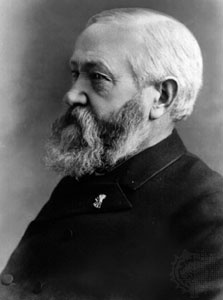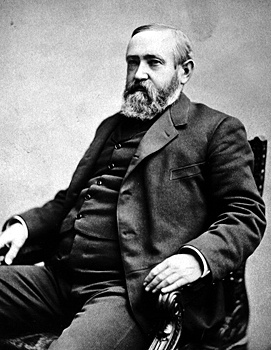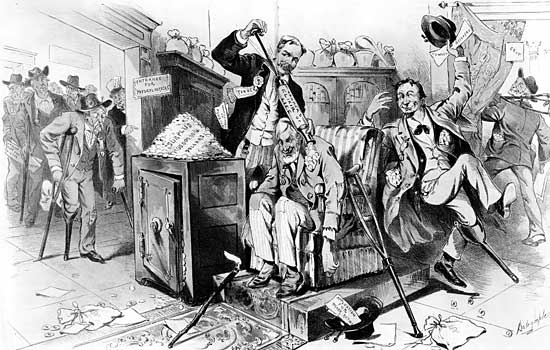Harrison, Benjamin
president of United States
born August 20, 1833, North Bend, Ohio, U.S.
died March 13, 1901, Indianapolis, Indiana
 23rd president of the United States (1889–93), a moderate Republican who won an electoral majority while losing the popular vote by more than 100,000 to Democrat Grover Cleveland (Cleveland, Grover). Harrison signed into law the Sherman Antitrust Act (1890), the first legislation to prohibit business combinations in restraint of trade. (For a discussion of the history and nature of the presidency, see presidency of the United States of America.)
23rd president of the United States (1889–93), a moderate Republican who won an electoral majority while losing the popular vote by more than 100,000 to Democrat Grover Cleveland (Cleveland, Grover). Harrison signed into law the Sherman Antitrust Act (1890), the first legislation to prohibit business combinations in restraint of trade. (For a discussion of the history and nature of the presidency, see presidency of the United States of America.)Harrison was the son of John Scott Harrison, a farmer, and Elizabeth Irwin Harrison and grandson of the ninth president, William Henry Harrison (Harrison, William Henry) (elected 1840). In 1852 he graduated with distinction from Miami University in Oxford, Ohio, and the following year he married Caroline Lavinia Scott (Caroline Harrison (Harrison, Caroline)), with whom he had two children. In 1854, after two years studying law, Harrison moved to Indianapolis, Indiana, to establish his own practice. Ignoring his father's contention that “none but knaves should ever enter the political arena,” Harrison found in Indianapolis an inviting arena for his political ambitions, especially in the newly formed Republican Party. He served in the Civil War (American Civil War) as an officer in the Union army, finally reaching the rank of brevet brigadier general. Resuming his law practice after the war, Harrison supported the Reconstruction policies of the Radical Republicans (Radical Republican). He failed to win the governorship of Indiana in 1876, but in 1881 he was elected to the United States Senate. As senator, Harrison defended the interests of homesteaders and Native Americans against the railroads, supported generous pensions for ex-soldiers, and fought for civil-service reform and a moderately protective tariff.
 Harrison was a kindly man of stout principle who possessed a keen intellect and a phenomenal memory. He could captivate an audience with stirring oratory and unhinge his opponents with a cold, discerning eye. On many occasions he willingly sacrificed valuable political support rather than abandon his convictions—as in 1882, when he opposed the Chinese Exclusion Act on the ground that it would abrogate rights guaranteed to the Chinese by the Burlingame Treaty of 1868. A deeply religious man—he was an elder in the Presbyterian church for 40 years—Harrison was known before, during, and after his years of public service as a man of moral courage.
Harrison was a kindly man of stout principle who possessed a keen intellect and a phenomenal memory. He could captivate an audience with stirring oratory and unhinge his opponents with a cold, discerning eye. On many occasions he willingly sacrificed valuable political support rather than abandon his convictions—as in 1882, when he opposed the Chinese Exclusion Act on the ground that it would abrogate rights guaranteed to the Chinese by the Burlingame Treaty of 1868. A deeply religious man—he was an elder in the Presbyterian church for 40 years—Harrison was known before, during, and after his years of public service as a man of moral courage. Cabinet of President Benjamin HarrisonNominated for the presidency by the Republicans in 1888, he lost the popular vote by 5,439,853 to Cleveland (Cleveland, Grover)'s 5,540,309 but won the election by outpolling Cleveland in the electoral college by 233 electoral votes to Cleveland's 168. Harrison's victory in the electoral college owed much to lavish spending by his campaign in the crucial swing states of New York and Indiana. (See primary source document: Inaugural Address. See also Cabinet of President Benjamin Harrison.)
Cabinet of President Benjamin HarrisonNominated for the presidency by the Republicans in 1888, he lost the popular vote by 5,439,853 to Cleveland (Cleveland, Grover)'s 5,540,309 but won the election by outpolling Cleveland in the electoral college by 233 electoral votes to Cleveland's 168. Harrison's victory in the electoral college owed much to lavish spending by his campaign in the crucial swing states of New York and Indiana. (See primary source document: Inaugural Address. See also Cabinet of President Benjamin Harrison.)Harrison's administration was marked by an innovative foreign policy and expanding American influence abroad. His secretary of state, James G. Blaine (Blaine, James G.), presided over the First International Conference of American States, held in Washington, D.C. (1889–90), which established the International Union of American Republics (later called the Pan-American Union) for the exchange of cultural and scientific information. In addition, Blaine successfully resisted pressure from Germany and Great Britain to abandon American interests in the tripartite protectorate over the Samoan Islands (1889), and he negotiated a treaty with Great Britain to refer to arbitration a long-standing controversy over the hunting of seals in the Bering Sea (1892). The administration also concluded treaties of commercial reciprocity with a number of foreign governments. In February 1893, after an American-led coup toppled Queen Liliuokalani in the Hawaiian Islands, Harrison placed a treaty of annexation before the Senate, but Democrats blocked ratification for the remainder of Harrison's term. (See primary source document: Controversy Over Hawaii (Benjamin Harrison and Grover Cleveland: Controversy Over Hawaii).)
In 1890 Republicans controlled both houses of Congress, but an economic depression in the agrarian West and South led to pressure for legislation that conservative Republicans normally resisted. The result was an accommodation in which conservatives gained the McKinley Tariff Act (1890), which substantially raised duties on most imports, but yielded to agrarians and reformers in measures such as the Sherman Antitrust Act (1890), which outlawed “every contract, combination…or conspiracy in restraint of trade or commerce,” and the Sherman Silver Purchase Act of the same year, which required the government to buy 4.5 million ounces of the metal every month. Farmers and debtors in the Free Silver Movement had long advocated a bimetallic (gold and silver) standard for the nation's currency in the belief that an increase in the amount of money in circulation would raise crop prices and allow for easier debt repayment.

 Although the treasury had a surplus at the inception of Harrison's administration, the “Billion-Dollar Congress” spent such enormous sums on soldiers' pensions and business subsidies that the surplus soon vanished. Many Americans, particularly farmers, viewed the Republican-controlled White House and Congress as wasteful and too closely aligned with the nation's wealthy elite. In the congressional elections of 1890, the Democrats recaptured the House of Representatives by a large majority, and during the remaining two years of his term Harrison had little, if any, influence on legislation. He was renominated at the party convention in Minneapolis (1892), but growing populist discontent and several major strikes late in his term—especially the violent steel strike at Homestead, Pennsylvania, in July 1892—largely accounted for his defeat by his old rival, Grover Cleveland, by an electoral vote of 145 to 277. Neither candidate campaigned much, owing in part to Mrs. Harrison's declining health and her death midway through the campaign.
Although the treasury had a surplus at the inception of Harrison's administration, the “Billion-Dollar Congress” spent such enormous sums on soldiers' pensions and business subsidies that the surplus soon vanished. Many Americans, particularly farmers, viewed the Republican-controlled White House and Congress as wasteful and too closely aligned with the nation's wealthy elite. In the congressional elections of 1890, the Democrats recaptured the House of Representatives by a large majority, and during the remaining two years of his term Harrison had little, if any, influence on legislation. He was renominated at the party convention in Minneapolis (1892), but growing populist discontent and several major strikes late in his term—especially the violent steel strike at Homestead, Pennsylvania, in July 1892—largely accounted for his defeat by his old rival, Grover Cleveland, by an electoral vote of 145 to 277. Neither candidate campaigned much, owing in part to Mrs. Harrison's declining health and her death midway through the campaign.Having retired to his law practice in Indianapolis, Harrison, at 62, married his deceased wife's niece and caretaker, Mary Lord Dimmick; they had one daughter. He emerged briefly to serve as leading counsel for Venezuela in the arbitration of its boundary dispute with Great Britain (1898–99). Harrison was also in much demand as a public speaker, and his series of lectures delivered at Stanford University was published in 1901 as Views of an Ex-President. He died of pneumonia that year at his house in Indianapolis. He was the last Civil War general to serve as president.
Additional Reading
Documents written by Harrison can be found in Public Papers and Addresses of Benjamin Harrison, Twenty-Third President of the United States: March 4, 1889, to March 4, 1893 (1893, reprinted 1969). Harry J. Sievers, Benjamin Harrison, 3 vol. (1952–68), with vol. 1 also available in a revised 2nd ed. (1960), is a biography. Harrison's administration is discussed in Homer E. Socolofsky and Allan B. Spetter, The Presidency of Benjamin Harrison (1987).
- Peebles
- Peeblesshire
- Pee Dee River
- Peekskill
- Peel
- Peel Commission
- Peele, George
- Peel River
- Peel, Sir Robert, 2nd Baronet
- Peenemünde
- peep
- peeping tom
- peep show
- Pee Wee Reese
- Pee Wee Russell
- Pegasus
- Peggy Fleming
- Peggy Guggenheim
- Peggy Lee
- Pegler, Westbrook
- pegmatite
- Pegolotti, Francesco Balducci
- Pegu
- Peg Woffington
- Pehowa